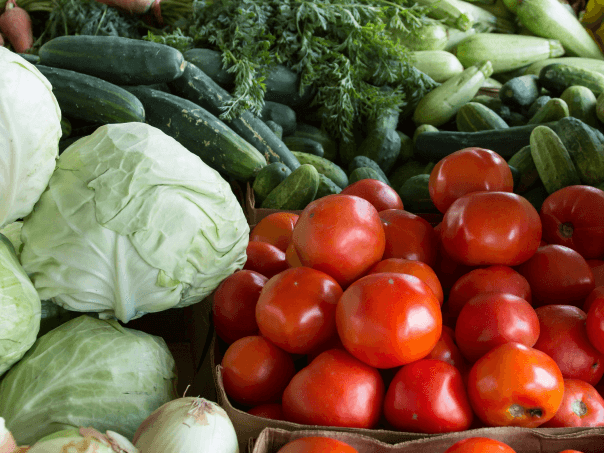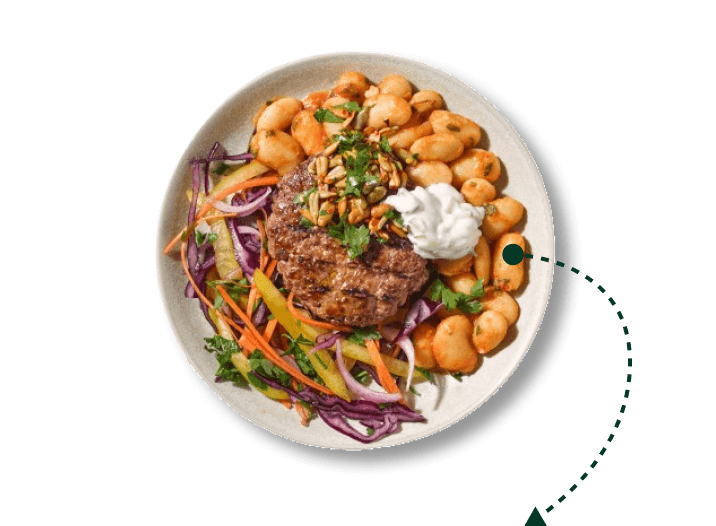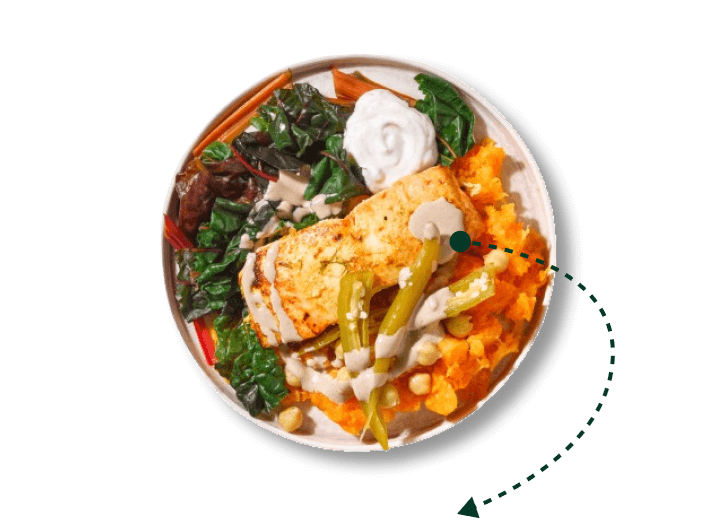At Frive, we’re redefining what food should be — real, wholesome, and made without the artificial stuff. Because your body deserves better than the ultra-processed products that flood supermarket shelves.
Our mission is simple: to fuel you with real nutrition that supports your health and vitality — not just for today, but for the long run.

We cook with real, ingredients, the way nature intended - clean, nutrient-rich, and full of flavour. Food that actually fuels you, not just fills you.

We stay away from ultra-processed foods (UPFs). Every Frive meal is made from real ingredients you can recognise, pronounce, and trust.

No fake flavours, colours, or refined crap. Just natural ingredients that support digestion, energy, and long-term health.

We only use premium oils like olive, avocado, and sesame - rich in healthy fats and antioxidants that support heart and brain health.
100% recyclable packaging
Portion-controlled meals to cut food waste
Organic ingredients that back sustainable practices
Because eating better should be good for you and good for the planet.
Perfectly balanced meals expertly crafted by chefs and guided by nutritionists.

Essential for energy and recovery, our meals include a smart balance of simple and complex carbs — helping you stay active and focused all day.

We use high-quality proteins; beef, lamb and free-range poultry to support muscle growth and hormone balance.

Healthy fats only - rich in essential fatty acids that keep your brain sharp, mood stable, and body performing at its best.
*Frive does not claim that any of its offerings will treat, cure, or prevent any disease or health condition; always consult with a health professional when making any dietary changes/choices*
British Heart Foundation, 2024. What are whole foods? Available at: https://www.bhf.org.uk. NHS Inform, 2024. Health benefits of eating well. Available at: https://www.nhsinform.scot. British Nutrition Foundation, 2024. A healthy balanced diet. Available at: https://www.nutrition.org.uk
Imperial College London, 2024. Plant-based UPFs linked with higher risk of cardiovascular disease. Imperial News. Available at: https://www.imperial.ac.uk. World Cancer Research Fund International, 2023. Ultra-processed foods linked to increased cancer risk, diabetes, and heart disease. Available at: https://www.wcrf.org. Food Manufacture, 2024. UPFs linked to 10% higher death risk. Available at: https://www.foodmanufacture.co.uk
Nutritionist Resource, 2024. Artificial sweeteners: The bitter truth about their health risks. Available at: https://www.nutritionist-resource.org.uk. MDPI, 2020. Diet and Nutrients in Gastrointestinal Chronic Diseases. Nutrients. Available at: https://www.mdpi.com. Imperial College London, 2024. Urgent action needed to reduce harm of ultra-processed foods to British children. Imperial News. Available at: https://www.imperial.ac.uk. British Journal of Nutrition, 2020. Healthy and unhealthy dietary patterns and the risk of chronic disease: an umbrella review of meta-analyses of prospective cohort studies. Cambridge University Press. Available at: https://www.cambridge.org
British Heart Foundation, 2014. Olive oil could cut risk of heart disease. Available at: https://www.bhf.org.uk. American College of Cardiology, 2024. Olive Oil Consumption and Cardiovascular Risk. Available at: https://www.acc.org. Nutrisense Journal, 2024. 5 Healthiest Cooking Oils [+ Ones to Avoid]. Available at: https://www.nutrisense.io
More Energy: A whole food diet, rich in complex carbohydrates and healthy fats, provides sustained energy by maintaining stable blood sugar levels. Consuming fewer processed foods reduces energy crashes, promoting overall vitality (British Nutrition Foundation, 2024). Reference: British Nutrition Foundation, 2024. A healthy balanced diet. Available at: https://www.nutrition.org.uk
Healthier Gut: Whole foods, particularly those high in fiber, promote a healthy gut microbiome, improving digestion and reducing inflammation, which is linked to better gut health (British Dietetic Association, 2021). Reference: British Dietetic Association, 2021. Food and mood: How do foods affect how you feel? Available at: https://www.bda.uk.com
Better Mood and Clarity: Research indicates that a Mediterranean-style diet, which is high in whole foods, antioxidants, and polyphenols, supports mental well-being by promoting neurogenesis and improving mood and cognitive function (University of Warwick, 2024). Reference: University of Warwick, 2024. New research shows 'profound' link between dietary choices and brain health. Available at: https://www.sciencedaily.com/releases/2024/04/240424111638.htm
Reduced Cravings: Whole foods help regulate blood sugar levels, reducing cravings by keeping you fuller for longer. The fiber and complex carbohydrates in whole foods reduce the urge for sugary, processed snacks (NHS Inform, 2024). Reference: NHS Inform, 2024. Health benefits of eating well. Available at: https://www.nhsinform.scot
Better Sleep: A nutrient-rich whole food diet, including sources of magnesium and antioxidants, helps regulate neurotransmitters, improving sleep quality (British Nutrition Foundation, 2024). Reference: British Nutrition Foundation, 2024. A healthy balanced diet. Available at: https://www.nutrition.org.uk